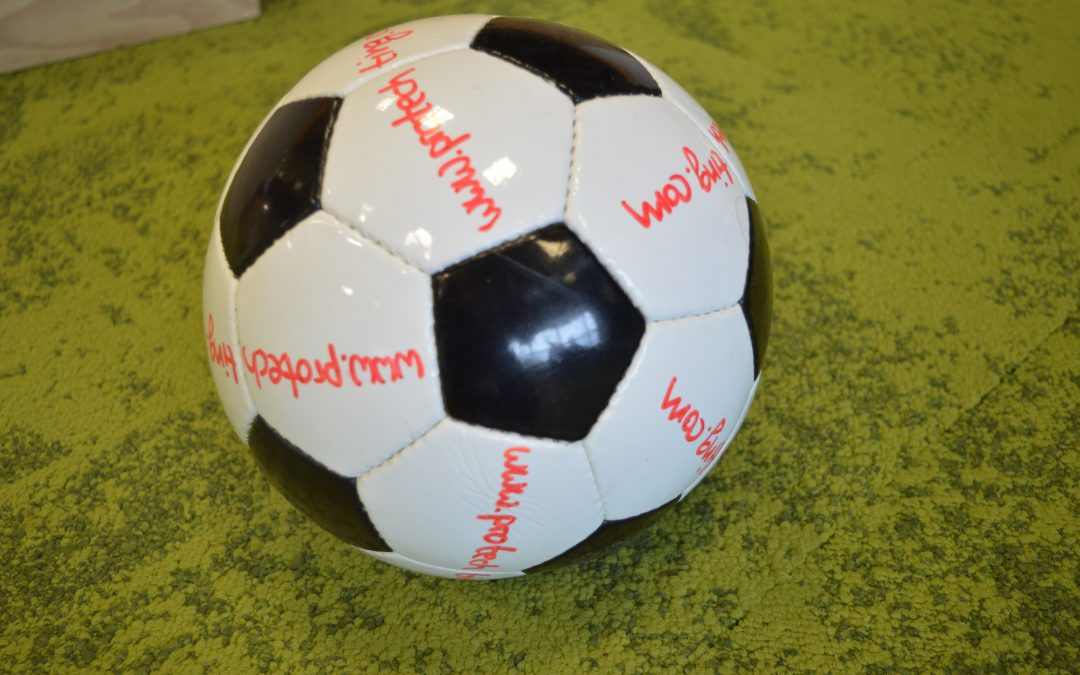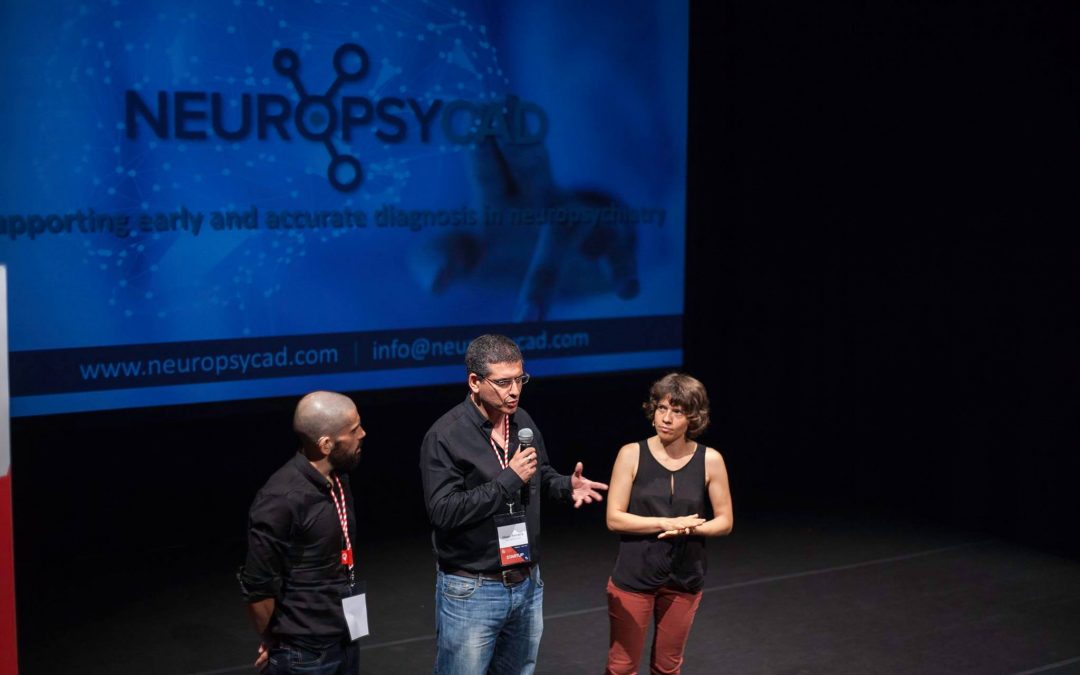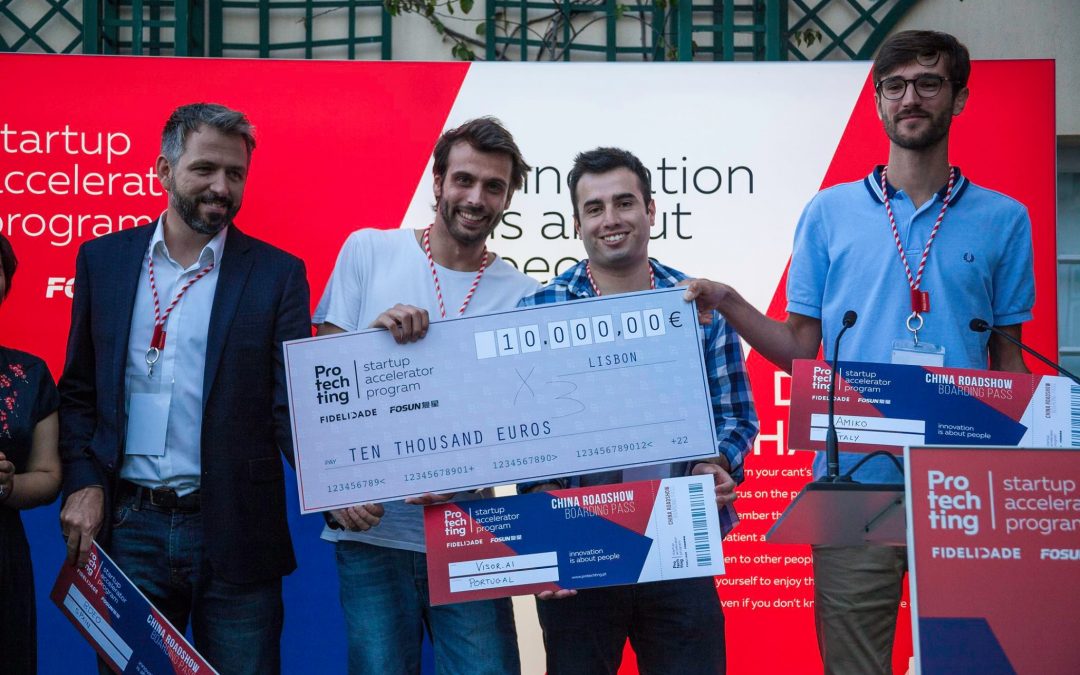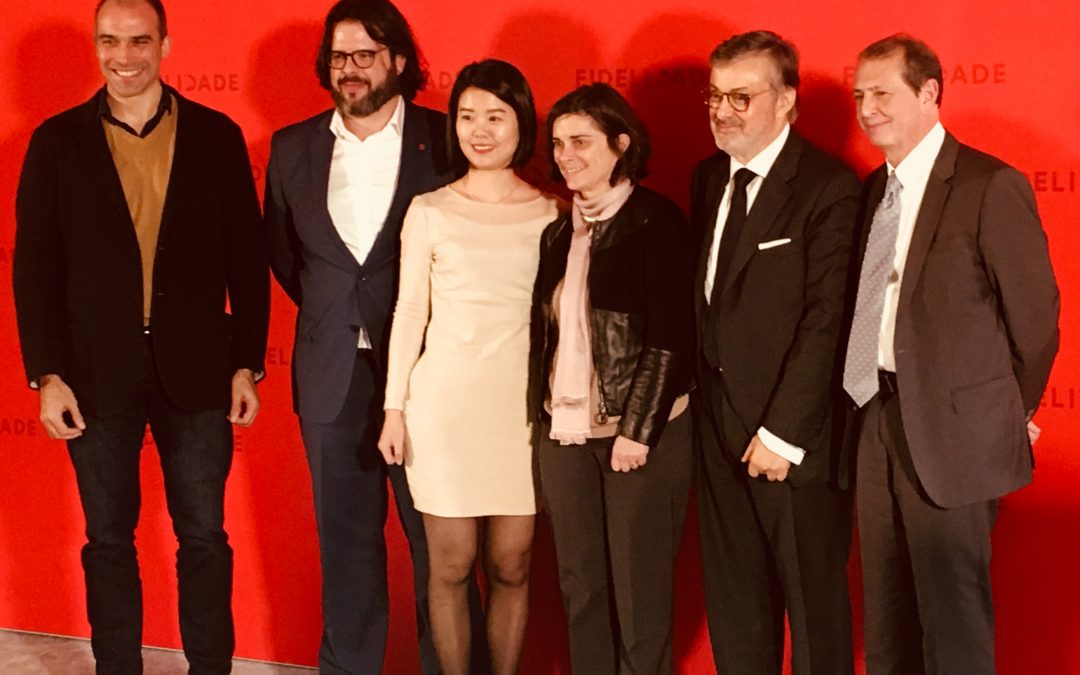
by anamaria | Mar 27, 2018 | Startups
Hauck & Aufhäuser supports for the first time the start-up accelerator program Protechting by Fosun, Fidelidade and Luz Saúde, which is already starting its third edition this year. On March 15, the launch of Protechting in Germany was announced during a business lunch with relevant industry participants at TechQuartier in Frankfurt. Located in the heart of Frankfurt, TechQuartier provides access to a valuable network of start-ups, mentors and investors and serves as a creative arena and meeting point for entrepreneurs and innovators from various industries.
Hauck & Aufhäuser will actively support the Protechting Program for the first time, seeking for technologically meaningful additions to its own banking business. The best Fintech of this edition of Protechting will have the opportunity to complete a 12-week pilot phase at Hauck & Aufhäuser and to further develop its own business model with the help of experts from the bank. This is why TechQuartier provided the perfect setting for the presentation of the Accelerator program as also Hugo Panquin, Marketing Manager of TechQuartier, explained in his welcome address to the guests.
Then Michael Bentlage, CEO of Hauck & Aufhäuser and Global Partner of Fosun, went deeper into the description of the Protechting program and its process. The Accelerator consists of various initiatives designed to promote a culture of innovation and collaboration and ultimately to increase the success rate of business models. After an eight-week training phase, the young entrepreneurs have the opportunity to convince a jury of experts of the success potential of their business model. The best projects are rewarded with a tour through China and gain access to Fosun and its associated companies. Furthermore, the best business model will receive a prize of 10,000 euros.
Hauck & Aufhäuser is playing an active role in the project for the first time. “We are extremely pleased to be able to participate in this year’s edition of Protechting alongside Fosun, Fidelidade and Luz Saúde. For Hauck & Aufhäuser, this project not only offers the opportunity to support young companies, but also enables us to look for possible additions to our own business model and to further expand our strategic pillars of digitization and internationalization,” concluded Michael Bentlage.
On behalf of Fosun, Alan Liu, General Manager of Wealth Management Department and Co-Executive Chief Representative of Frankfurt office introduced the audience to Fosuns history, which can be described as a typical start-up story. “In 1992 four students founded Fosun with 4,000 $ and now the company is one of the largest global companies with Chinese roots. The entrepreneurial spirit is part of our DNA an we encourage the youth to set up their own business. Fosun is looking forward to support the growth of small companies through innovative initiatives like Protechting.”
At the end of the session, Harald Patt, Managing Director of Fosun’s Wealth Management Department, did a presentation on Fintech innovation, introducing the fintech ecosystem in Germany and China and it’s impact on the banking industry. Finally, the Tech Quartier offered enough space for interesting discussions with the guests present – a mixture of entrepreneurs, journalists and start-ups. The main focus was on the promotion of the project. Because from the start, start-ups with innovative business ideas from the Insurtech, Fintech and Healthtech sectors can apply for the Accelerator program until 29 April. Interested entrepreneurs can obtain more information on the process, objectives and content of Protechting at any time at www.protechting.com.

by Carolina Santos | Mar 27, 2018 | Startups
Applying to an open innovation program is not only about the prize money. It’s not as much about winning as it is about getting to know the corporates and getting pilots with them. Applying to an open innovation is a business decision.
That was the case for Neuropsycad. Despite not having won Protechting’s last edition, they managed to get the wanted pilot with Luz Saúde. When speaking with Diana Prata, Co-founder of Neuropsycad, last week I asked her if the fit between her startup and Luz Saúde was something built throughout the bootcamp and she told me that even before they had a meeting they already knew they would be good for each other.
Diana says that the biggest advantage of Protechting is making the access to data easier. For example, Luz Saúde already had the ethical board approve sharing data for future pilots that could come out of Protechting and Neuropsycad ended up benefiting from that. Usually it takes a long time until a startup has access to patient’s data.
One year later the startup has studied 20 patient’s brain scans and identified their diseases. How does it work? Luz Saúde sends them the scan but doesn’t disclose the disease and through that scan Neuropsycad has to identify the disease and come up with a diagnosis.
They are now working as a sort of second opinion and the good thing about working with medical doctors, besides soaking up their knowledge, is to improve what features in their report like what kind of graphics doctors think are more relevant, which information is more important to have.
When it comes to accuracy the percentages vary. The startup is able to identify with 100% of accuracy if a patient has Alzheimer or if it’s healthy but those numbers change when comparing a patient with Alzheimer with a patient with dementia to 87%. In order to keep up with the work they’ve been doing so far they’re waiting to receive more data from patients and they expect to have studied more until the end of this year.

by Carolina Santos | Mar 23, 2018 | Startups
When Ectosense participated on Protechting they ended up with a pilot with Luz Saúde. Since then they’ve come a long way, managing to secure a €1.5 million in seed funding in a round led by Saffelberg Investments, a leading Brussels-based private equity group, this week.
One year ago they spoke with Maria Almeida about their product, how they closed important partnerships with big corporates in the industry and how is it like to build a startup in healthcare.
In light of the recent events and since Protechting has its applications open it’s only fair we republish the interview they did a year ago.
So, Duarte, for those who don’t know, what is Ectosense?
Ectosense is a startup in the area of medical devices, more specifically to diagnose sleeping disorders, particularly sleep apnea. For those who don’t know, sleep apnea is a condition that makes people stop breathing while they’re sleeping. Imagine that you’re going to bed and after you fall asleep I cover your mouth and nose with my hands and you can’t breathe, so you wake up to take my hands from your mouth and nose and fall back to sleep. After a few minutes of sleep, it happens again, and you can’t breathe, and so on. It happens during the whole night. In serious cases, this can happen up to 100 times per hour. The problem with sleep apnea is that prevents oxygen from flowing into your brain, leading to an adrenaline charge, which speeds up your heart rate so that you can wake up and breathe again. This has some pretty negative consequences for your body. Not just for the low levels of oxygen but also because of the effort your heart makes.
Sleep apnea can lead to many chronic diseases that contribute to a considerable loss in quality of life. This also represents significant healthcare costs, which are usually supported by insurance companies, and for us, this was actually one of the reasons why we wanted to join Protechting.
And how are you currently developing your product?
What we initially developed was a software that would automate the diagnosis for sleep apnea through sensors which could be integrated with mobile solutions. Instead of having the usual method of diagnosis that is very complex. They basically make you sleep with many different sensors attached to your body, like on your head, on your face, on your eyes… Or, if you want to do the most accurate exam you have to sleep at the hospital and be monitored during that time. Later on, the doctor will review the results manually. This is very expensive, people have to wait for a long time to schedule this exam, in Portugal for example, it takes you between 6 months and 2 years to schedule the exam.
What we do is take a few sensors from this complex system, which can be integrated with mobile solutions, and we add artificial intelligence to these sensors so that we can have better quality in the diagnosis and more information from these sensors that weren’t previously extracted. Nowadays, you register the results and analyze them manually, while we use algorithms to extract more information from these sensors.
The current method of diagnosis makes no sense. It’s complex and costly, and it deals with a condition that affects 4% to 7% of the population and in more than 80% of the cases people haven’t yet been diagnosed. We’re talking about a condition that has severe consequences in your quality of life, in your work, in your productivity, so we thought why hasn’t somebody developed an easier solution?
As any healthcare product, you must have to conduct studies to test it before you actually launch it. How is it going so far?
These tests or studies serve 2 different purposes actually. First, it helps in the development of the product, because as we have machine learning algorithms we need a large amount of data to make it reliable. Second, it’s needed to validate the product with doctors, university professors, and showcase it to the medical community and show it has a good performance when compared to the current solutions. And actually for us, it helps in terms of marketing because we’re not selling this as a gadget, we’re selling it as a medical device to be used in the medical practice.
Who are your customers then? Who is your target?
Our customers are the hospitals, but also the healthcare insurance providers. These insurance providers are the ones who mostly feel the economic impact of this condition not being diagnosed. Just to give you an idea, in the US the hidden costs of sleep apnea are estimated to be between 60 and 65 billion dollars, which is a tremendous amount.
Which studies have you conducted and how were you able to get the hospitals to run these tests?
In Portugal we’re running a study with one of the major hospitals in Lisbon, “Hospital Santa Maria”, and that on is still on-going. And another one that’s about to start at “Hospital Beatriz Angelo” that will be longer as we will monitor people’s sleep during several nights in the patient’s home. The goal is to see how the patient responds to sleeping with this device for several nights, and it has a particular advantage because sleep apnea can vary a lot from night to night, and sometimes the current diagnosis method can miss this because they only do it for one night. This means that 1 out of 4 patients can miss his or her treatment because of this. So, during this study will analyze the benefits of using the device more than once.
What feedback have you received so far?
It’s been really good and we’ve achieved the CE certification with these studies. So, that’s already taken care of. The doctors see this as a necessary solution that is very different from what’s now available, and that can diagnose many cases which they struggle with in the past. As for the insurance providers, they spend enormous amounts of money which correspond to a significant percentage of their revenues. So, insurance companies have all the interest in the world in having this kind of product.
Talking about insurance providers, you have participated in the first edition of Protechting, the accelerator by Fidelidade and Fosun. Fidelidade is one the leading insurance companies in Portugal. Were you able to work with them while developing your product?
Yes, we did work closely with them, particularly with Luz Saúde, which belongs to Fidelidade. Actually, the “Hospital Beatriz Angelo” where we’ll conduct one of our studies is from Luz Saúde and this deal came from Protechting. After the program, we kept on talking to Luz Saúde and this opportunity came out. However, we haven’t yet focused on having Luz Saúde using our product, because we’re not there yet, we’re still conducting the study so, we’ll see where it goes from here. From Multicare, which is the insurance provider of Fidelidade, we’ve been talking with them regularly and they’ve been giving us a lot of support and mentoring on how we can deliver the best value proposition to insurance providers. Multicare is actually considering including this exam in their insurance plan so, we’ll see.
Protechting, overall, was a great experience. It is actually very different from most acceleration programs because it allows you to have direct contact with very experienced mentors from your industry and with a wide network of contacts mostly in the areas of healthcare and insurance. It would be extremely difficult to reach out to these high-level players if we weren’t in Protechting. Another thing is that you also get plenty of exposure from Fidelidade, Fosun, and Luz Saúde, so in the end, Protechting acts like a shortcut for you to tap into this tough industry.
What is your current biggest challenge?
The health certifications and bureaucracies were one of our biggest challenges, but fortunately, we’re done with that. So, for now, we have two big challenges ahead of us. The first one is that our product has to be used with a specific hardware that the hospital needs to buy. This equipment is very expensive so, our plan is to go for a different model in which we also provide a specific hardware that can be used with our software. This hardware will be development in partnership with the biggest investigation and development institute of nanoelectronics in the world, which is also based in the same city we’re in, Leuven. This institute also has part of our company and we’re working closely with them to develop a hardware that is produced at a lower cost and that can be sent by mail. So, one of our biggest challenges is developing this hardware, and getting the medical certification, as this is another medical device.
The second and probably biggest challenge is going to market with this product. So, we’ll have to sell the software, which already exists, in combination with the hardware we’re developing. This includes selling to insurance providers and a few hospitals, even though our main focus is the insurance providers because they can reach to a larger number of people and their main focus is in prevention, which is greatly aligned with what we’re doing. Sleep apnea causes many chronic diseases including, heart failure, hypertension, diabetes, and many others, so, this early exam to diagnose sleep apnea can be extremely helpful to prevent these diseases.
Healthcare is an over-regulated and expensive industry to disrupt, and it has a history of failing to implement ambitious IT projects. What makes you think you’ll be able to disrupt this industry?
In this area, startups have lots of disadvantages. For example, for us, it’s much more difficult to start from a medical certification process from scratch, because we have very little experience, and the process is extremely arduous and bureaucratic. On the other hand, startups have the advantages of being small, efficient, and young. So, we usually work very long hours and we execute faster. In our case, for instance, the development of the product and getting the certification took us 1 year. Every time I say this to anyone who is working in healthcare, they’re usually surprised that it took us so little to get a product in healthcare up and running in so little time. And, I honestly think this has to do with us being a small company which allows us to be more efficient and cut the bureaucracies that most big companies have. However, these big companies have the industry knowledge that we don’t have, and they also have the funds to invest in this kind of solutions, which for a startup is usually harder to get. So, it’s obviously crucial for you to get partnerships and work together with other players in the industry.
I strongly believe that Ectosense will overcome all the obstacles and be successful because we are the most cost-effective, convenient, and accurate solution in the market. We have the only solution that allows you monitor sleep for several nights, and it’s the smallest and cheapest device.

by Carolina Santos | Mar 21, 2018 | Startups
Last time I wrote about Protechting I mentioned that last year instead of one winner, there were three. Visor.ai was one of them, they won 10.000 euros and traveled to China and between all this they made business that lasts until today.
Gonçalo Consiglieri, Visor.ai Co-founder, said that unlike other programs he has participated in, Protechting is very focused on people, making it easier for startups to arrange meetings with the partners who are all very involved and willing to hear from them.
When Visor.ai entered the program their solution wasn’t quite ready yet, there were some changes to be made and the program ended up challenging them to develop their product according to a client’s real needs. All this in one week during the bootcamp and 2 or 3 months for the pilot.
The importance of a bootcamp was also underlined by Gonçalo. It is a fact that nowadays pretty much all programs have a bootcamp but if we go one or two years back that wasn’t the reality. The bootcamp helps both sides, the partners side and the startups side. It’s not only the partners who use the bootcamp as a barometer to see if there’s a fit with startups, the other way around also applies. Startups can also understand in the course of a week if their solution can be valuable to the partners, but more than that startups get to grow and adjust their product and for some of them that’s what’s most valuable.
It’s been a year since Visor.ai won Protechting’s last edition and now they have another project with Fidelidade besides the initial one. The one they’re focused right now is related with their website and how to better get leads. After one year, the three winner startups are also still friends with each other. Hard to say if it was the bootcamp or the China trip who bond them, or probably it was both, truth is it remains until now. And I mean they actually stay at each other’s places when they go to their countries and help each other on their solutions, so it’s not a fake friendship.
Asked if Protechting changed them and their business, Gonçalo says that they’ve definitely changed and thanks to the programme they’re now developing features they wouldn’t think about if it weren’t for Fidelidade. Actually now they only develop what their clients ask for and stopped wasting time developing stuff just because they thought it was cool.

by Carolina Santos | Mar 14, 2018 | Startups
Fidelidade and Fosun launched the third edition of the startup acceleration programme – Protechting -, which aims to support the development of international projects that contribute to improve the protection of people in three strategic areas – Healthtech, Insurtech and Fintech.
Just like the other two editions, this third one will also be developed with the support of Beta-I, also with recently reinforced valences, allowing it to contribute in an even more efficient way to the innovation ecosystem.
As a result of the first 2 editions of this Open Innovation incentive programme, 6 startups, from 4 different countries, still maintain cooperation with Fidelidade Group and with Luz Saúde, contributing to the creation and implementation of innovative solutions.
This third edition is devoted to the promotion of international entrepreneurship and will present some innovations. Luz Saúde will reinforce its participation in the programme, and the German private bank Hauck & Aufhäuser, owned by Fosun Group, will integrate this project for the first time, seeking to attract technological innovation for financial services through Fintech.
The main goal is still to find more consistent startups to the programme and in order to do that international scouting initiatives will happen during the application phase, with partner entities and at entrepreneurship events specifically dedicated to Insurtech and Fintech, in London, São Paulo and Silicon Valley. The programme will also be presented during Startup Europe Week, taking place in Brussels, between May the 5th and 9th. Showing how far this programme has come and how much it grew.
The excitement among partners is understandable, not only because there’s new companies participating but also because every year they are able to reach more countries. And that is one of the reasons why it’s increasingly positioning itself as an internationally renowned acceleration programme.
Last year three startups were selected on the Pitch day and later went to China to participate in Protechting | Innostar. The good thing about this is that initially only one startup was meant to be selected to go to China, but they liked all three so much they couldn’t choose. So, we never know what might happen this year.





